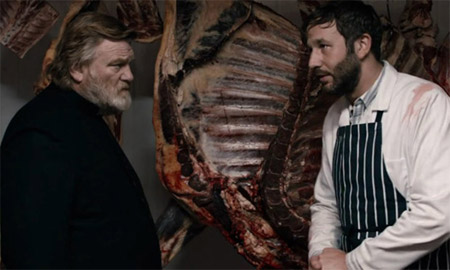
| HOME |
| NERVE |
| REVIEWS |
| ARCHIVE |
| EVENTS |
| LINKS |
| ABOUT US |
| CONTRIBUTORS |
| BACK ISSUES |
| CONTACT US |
Calvary (15)
 Directed by John
Michael McDonagh
Directed by John
Michael McDonagh
Picturehouse,
Liverpool
From 18th April 2014
Reviewed by Colin Serjent
This is a dark and sombre story about the juxtaposition of nature and human nature, and human nature and its innate failings.
Director John Michael McDonagh confronts issues about sin and redemption, faith and uncertainty, and the purpose, essence and relevance of the Church in contemporary life.
The film opens in the confessional box where father James Lavelle (Brendan Gleeson) is told that he will be murdered on the following Sunday, not because he is guilty of any crime against the man speaking to him (he alleges he was raped when he was a young child by another priest) but because he is innocent and a good priest, who cares for his parishioners.
This is the case despite the fact that the parishioners in the district he resides in, includes adulterers, drug takers, wife beaters, male prostitutes and atheists - much like any other local community!
McDonagh suggests that they have become that way in their particular lifestyles because of the Catholic child abuse scandal and the Irish financial fiasco. But surely they would have adopted this preference in living their lives despite of these two major events.
He injects a lot of telling and true-to-life dialogue, laced with a degree of very dark humour - almost as black as the renowned guiness beverage - with some outstanding acting performances, notably by Gleeson), the atheistic doctor (Aiden Gillen) and his daughter, Fiona (Kelly Reilly).
A lot of the community, based near Sligo, have given up the ghost on the Church, aptly symbolished by the destruction by an arsonist of the local church - ashes to ashes, dust to dust!
There is some majestic cinematography of the natural surroundings by Larry Smith, including spellbinding aerial shots of the coastline and fields, waves crashing against rocks, and of birdlife, particularly a bewitching split second image of a robin perched on a wooden post.
In essence Calvary is a profound and compelling critique of Mankind's abject loss of spirituality in all its myriad forms.